Chief Minister and Council of Ministers | Indian Polity for UPSC CSE PDF Download
Chief Minister
- He is the head of the state government.
- While the governor is the nominal executive of the state government, the person who becomes the chief minister is the real executive of the government.
- The real executive is called ‘de facto’ executive which means, ‘in fact, whether by right or not.’
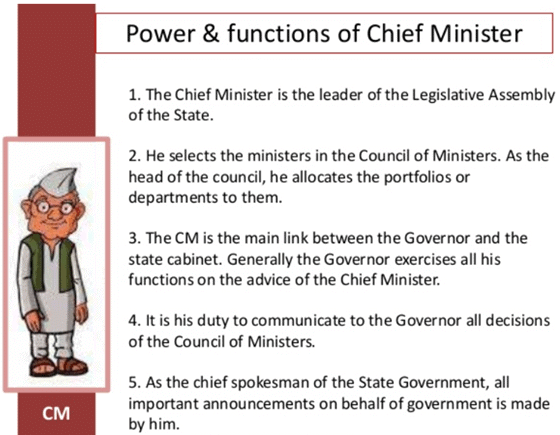
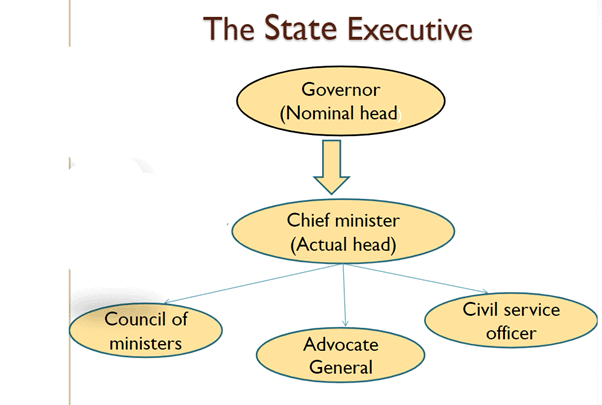
Appointment of Chief Minister
- Just like the Prime Minister, provisions of whose appointment are not mentioned in the Indian Constitution, Chief Minister’s appointment particulars are not mentioned in the Constitution.
- According to Article 164 in the Indian Constitution, Governor appoints Chief Minister.
- However, the Governor cannot appoint any random person as the Chief Minister but has to follow a provision.
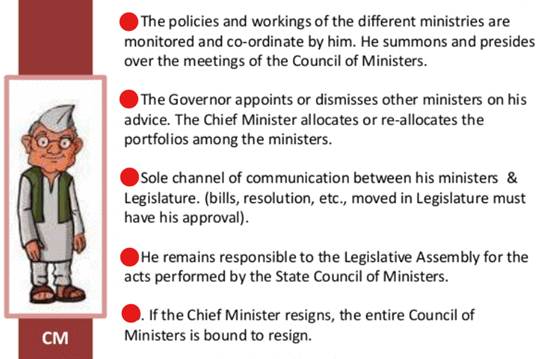
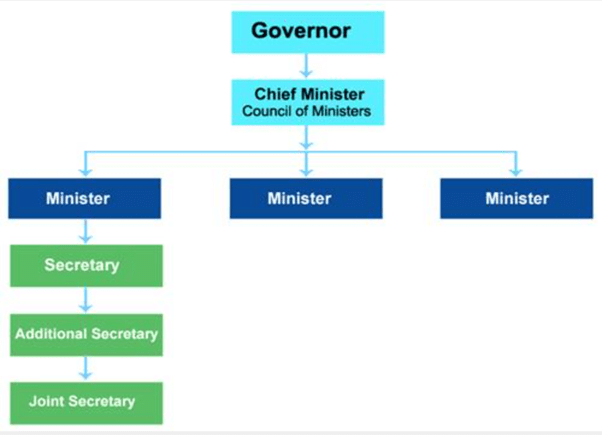
A leader of the party that has got the majority share of votes in the assembly elections, is appointed as the Chief Minister of the state.
- When no party gets a majority in the elections, the governor exercises his own discretion and appoint a Chief Minister accordingly.
- In a case where no party has won the majority votes, Governor appoints the member of the largest party or one from the coalition (if occurs) as the Chief Minister and then he is given 1 month time to prove confidence in the house.
- If the incumbent dies in the office, Governor at his own discretion can appoint a Chief Minister however, the ruling party nominates a member and Governor usually appoints that person as the Chief Minister. This person then has to prove confidence within a specified time.
- A person not belonging to either house (Legislative Assembly & Council) can also be appointed as the Chief Minister, however, within six months of his tenure as a CM he should be elected to either house without which he ceases to be a CM.
- Chief Minister can belong to any house in the State Legislature.
Term of Chief Minister’s office
Aspirants should clearly understand that the term of Chief Minister is not fixed and he holds his office during the pleasure of the governor.
- Governor cannot remove him any time.
- Governor cannot even dismiss him till the time he enjoys the support of the majority of the house.
- When CM loses his majority support, he has to resign and Governor dismisses him then.
The main function of the Chief Minister
The CM of the state performs functions in relation to the different categories of people:
1. In relation to the Council of Ministers
2. In relation to the Governor
In relation to the State Legislature
Other than that, he also performs the following functions:
1. He chairs the State Planning Board
2. He is a vice-chairperson of the concerned zonal council by rotation, holding that office for a period of one year at a time
3. He is a member of the Inter-State Council and National Development Council which are headed by the Prime Minister.
In Relation to the Council of Ministers
The Chief Minister is the head of the state council of ministers. He performs the following functions:
1. He recommends to the governor on who to appoint as ministers
2. He designates or reshuffles the portfolios of the ministers
3. He can ask a minister to resign
4. Meeting of the council of ministers is headed by him
5. All activities of the ministers are guided and controlled by the Chief Minister
6. If he resigns, the entire council of ministers collapses.
If the CM dies (or resigns), the council automatically dissolves.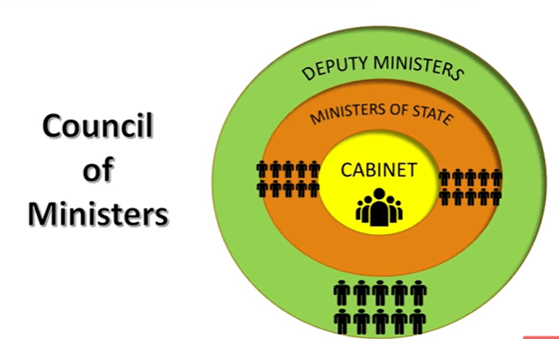
Difference between Cabinet and Council of Ministers
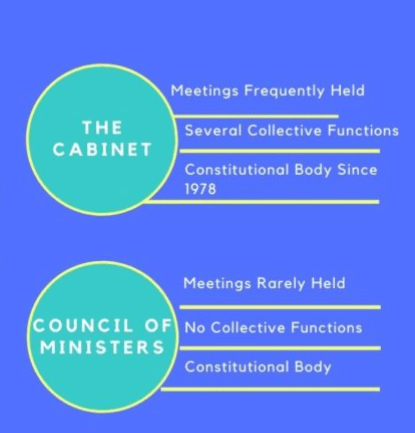
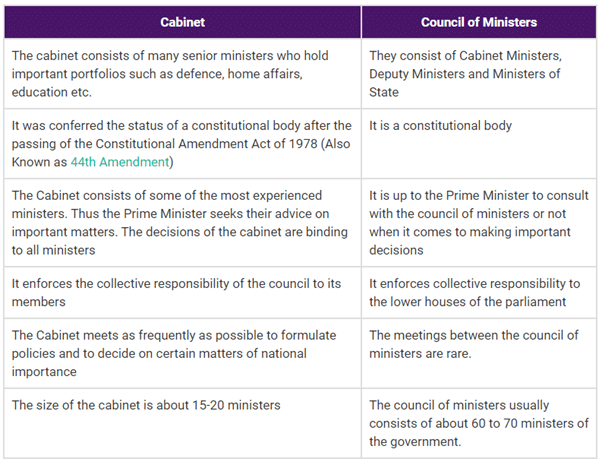
In Relation to the Governor
In relation to the governor, the Chief Minister performs the following functions:
1. All the activities, decisions that are taken up by the council of ministers are communicated to the governor by the chief minister
2. To report to the governor, information about the administrative affairs if and when asked by the governor
3. If any minister has decided on any issue, the same has to be reported to the Governor by the Chief Minister when the same has not been considered by the council.
4. He gives his advice to the governor for the appointment of the following persons:
(i) Advocate-General
(ii) Chairman of state public service commission
(iii) The state election commission, etc.
In Relation to the State Legislature
He is the leader of the house and holding this position, he performs the following functions:
1. Before a governor prorogues and summons the sessions of the state legislature, the Chief Minister’s advice is a must
2. Legislative Assembly can be dissolved at any time on his recommendation to the governor
3. All government policies are announced by him on the floor of the house.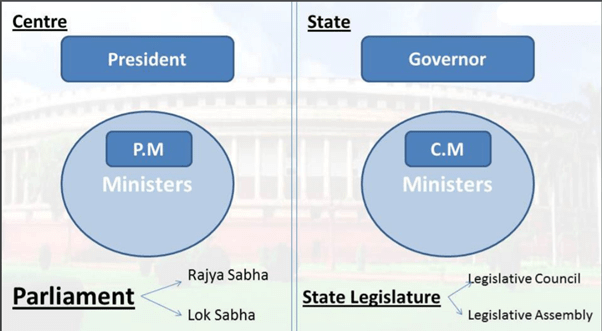 Parallel Analysis of positions at the state and centre level
Parallel Analysis of positions at the state and centre level
Chief Minister and the Governor
- The relationship between the Chief Minister of the state and the state’s governor has always been in the news.
- The debate on the authority of the respective posts has made the rounds throughout.
- IAS aspirants will understand the dynamics shared by the CM and the Governor by following the details given below:
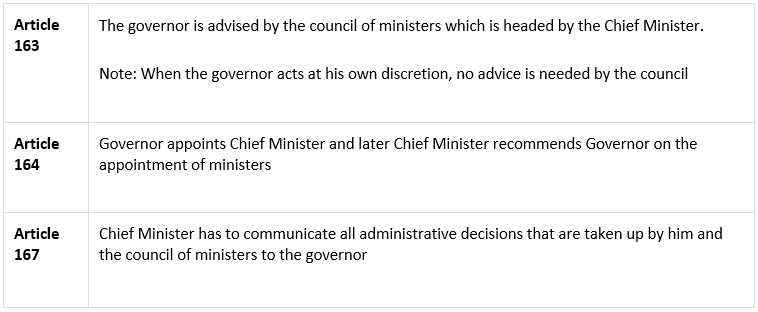
State Council of Ministers
- The State Council of Ministers is similar to the Central Council of Ministers. The state council is headed by the Chief Minister.
- The council comprises ministers appointed by the governor on the recommendation of the CM.
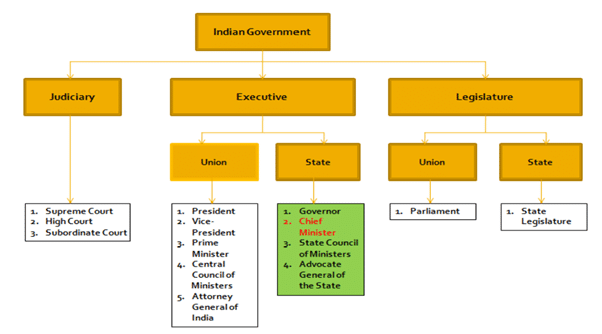
Appointment of Council of Ministers
They are appointed by the governor on the advice of the CM. Governor also appoints a tribal affairs minister for the following states:
1. Chhattisgarh
2. Jharkhand
3. Madhya Pradesh
4. Odisha
- Bihar was also one of the states to have tribal affairs minister, however, 94th Amendment Act 2006 freed Bihar from this obligation.
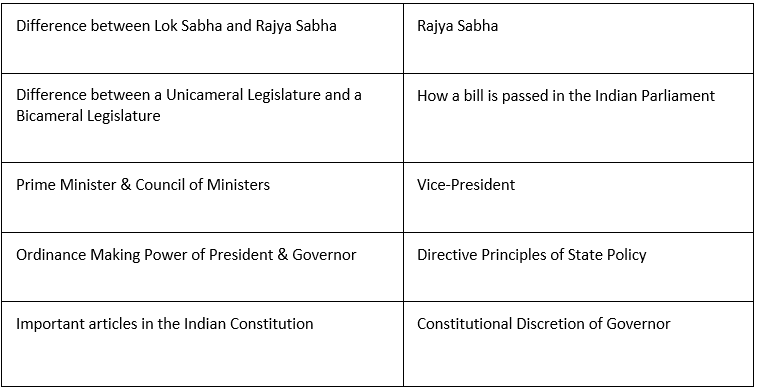
Composition of Council of Ministers
- The size of the council is not mentioned in the Indian Constitution. Chief Minister decides the size and the rank of the ministers as per the requirement in the State Legislature.
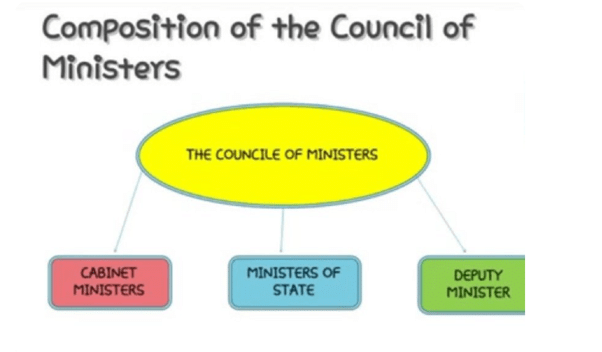
There are three categories of Council of Ministers:
1. Cabinet Ministers
2. Ministers of State
3. Deputy Ministers
Collective Responsibility
- The provision of collective responsibility is dealt with by Article 164. The Article mentions that the council of ministers are collectively responsible to the state legislature.
- This means that all the ministers own joint responsibility to the legislative assembly for all their acts of omission and commission.
- When the legislative assembly passed a no-confidence motion against the council, all the ministers of the council have to resign including those belonging to Legislative Council too.
- The council of ministers can advise the governor to dissolve the legislative assembly on the ground that the House does not represent the views of the electorate faithfully and call for fresh elections. The governor may not oblige the council of ministers which has lost the confidence of the legislative assembly.
Articles related to State Council of Ministers
- The following articles of the Indian Constitution are important to be read by the aspirants for UPSC 2021. These articles are attached to the council of ministers. Refer to these in the table given below:
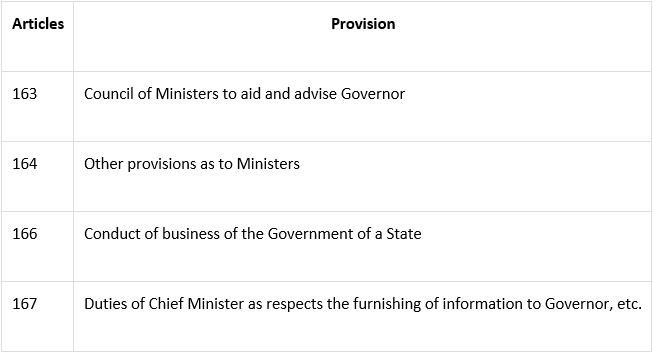
|
154 videos|998 docs|260 tests
|
FAQs on Chief Minister and Council of Ministers - Indian Polity for UPSC CSE
| 1. What is the role of the Chief Minister in the State Council of Ministers? |  |
| 2. How is the Chief Minister appointed in the State Council of Ministers? |  |
| 3. What is the function of the State Council of Ministers? |  |
| 4. How is the Council of Ministers formed in a state? |  |
| 5. Can the Chief Minister and the Council of Ministers be removed from their positions? |  |
















